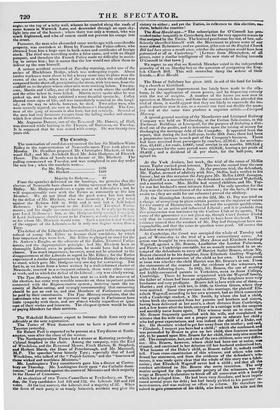fat Count rp.
The nomination of candidates to succeed the late Sir Matthew White Ridley in the representation of Newcastle-upon-Tyne took place on Monday. Hr. fleadlain proposed Mr. Christopher Blacken, of Oak- wood Hall ; and Mr. Archibald Reed Mr. John Hodgson, of Elswick House. The show of hands was in favour of Mr. Marken. The polling commenced on Tuesday, and was completed in one day under the new law ; when the numbers were—
For Mr. Bokser] 1576 Mr. Blackett 1523 Majority for Hodgson 48
From the speeches delivered on the hustings, we perceive that the electors of Newcastle have chosen a fitting successor to Sir Matthew Ridley. Mr. Hodgson professes a vague sort of Liberalism ; but be will unqueetionably, vote with the Tories as constantly as the late Member. We do not think that the good cause ha; lost much by the defeat of Mr. Blacken, who was formerly a Tory, ued voted against the Reform Bill in 1832, and is now but a half-baked Reformer. He is opposed to the Ballot mini Triennial Parlia- ments; and his single recuinnunalatialm seems to be a ple,!ge to sup- port Lo...d Melbourne : but, as Mr. Hodgson fairly vin,u6lt rein,:: k, (1, if Lord Alelnourne should cease to be Premier, nobody could tell how or for whom Mr. Blacken would vote. Such a person is not worthy of the support of the Liberals — he is only one degree worse than a Tory. The defeat of the Liberals has been ascribed in part to the unexpected refusal of young Mr. Ellice to become their candidate, by which four important days were lust. Mr. Ellice is pledged to stand for the St. Andrew's Burghs, as the advocate of the Ballot, Triennial Parlia- ments, and the Appropriation principle : had Mr. Blacken been as thoroughly Liberal, even in profession, he would have had a better chance. Too much importance, however, must not be attached to the disappointment of the Liberals in regard to Mr. Ellice; for the Tories experienced a similar disappointment by Sir Matthew Ridley's declining to stand, which gave Mr. Hodgson only one day for canvassing. The fact is, as we learn from a letter written by a well-informed elector of Newcastle, inserted in a subsequent column, there were other causes at work, and to which the defeat of the Liberal lily was chiefly owing.
The Tyne Mercury, which has been sent to us with the account of the election, has some very sensible remarks on three important points connected with the Representative system ; insisting upon the ne- cessity of Ballot-voting, and strongly recommending that canvassing should be put an end to, and that Members of Parliament should be paid by their constituents. The Tyne Mercury complains, that the individuals who are sent to represent the people in Parliament have little sympathy with them, and are almost wholly regardless or igno- rant of their wishes and interests. The cheapest system would be that of paying Members for their services.


























 Previous page
Previous page